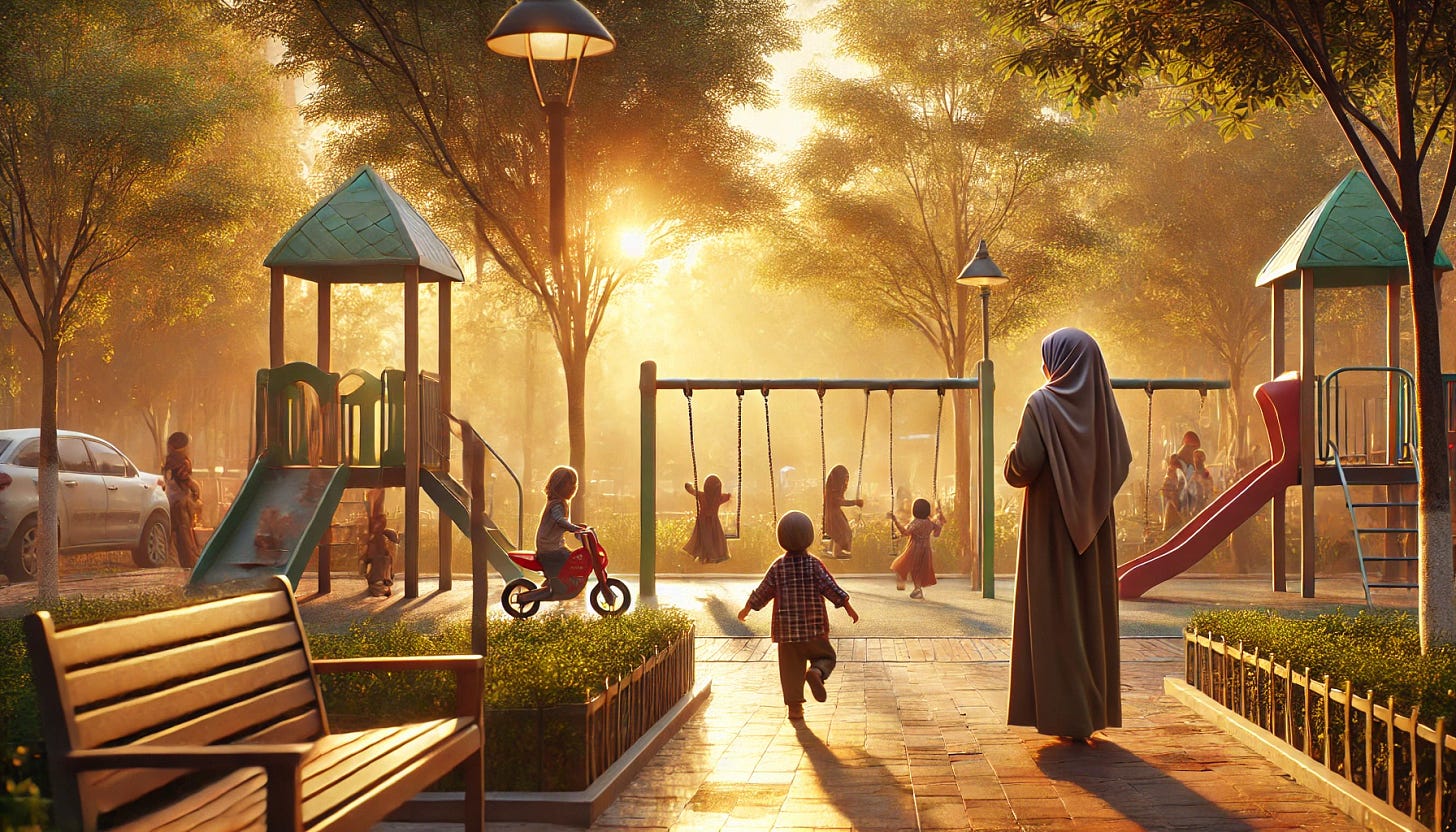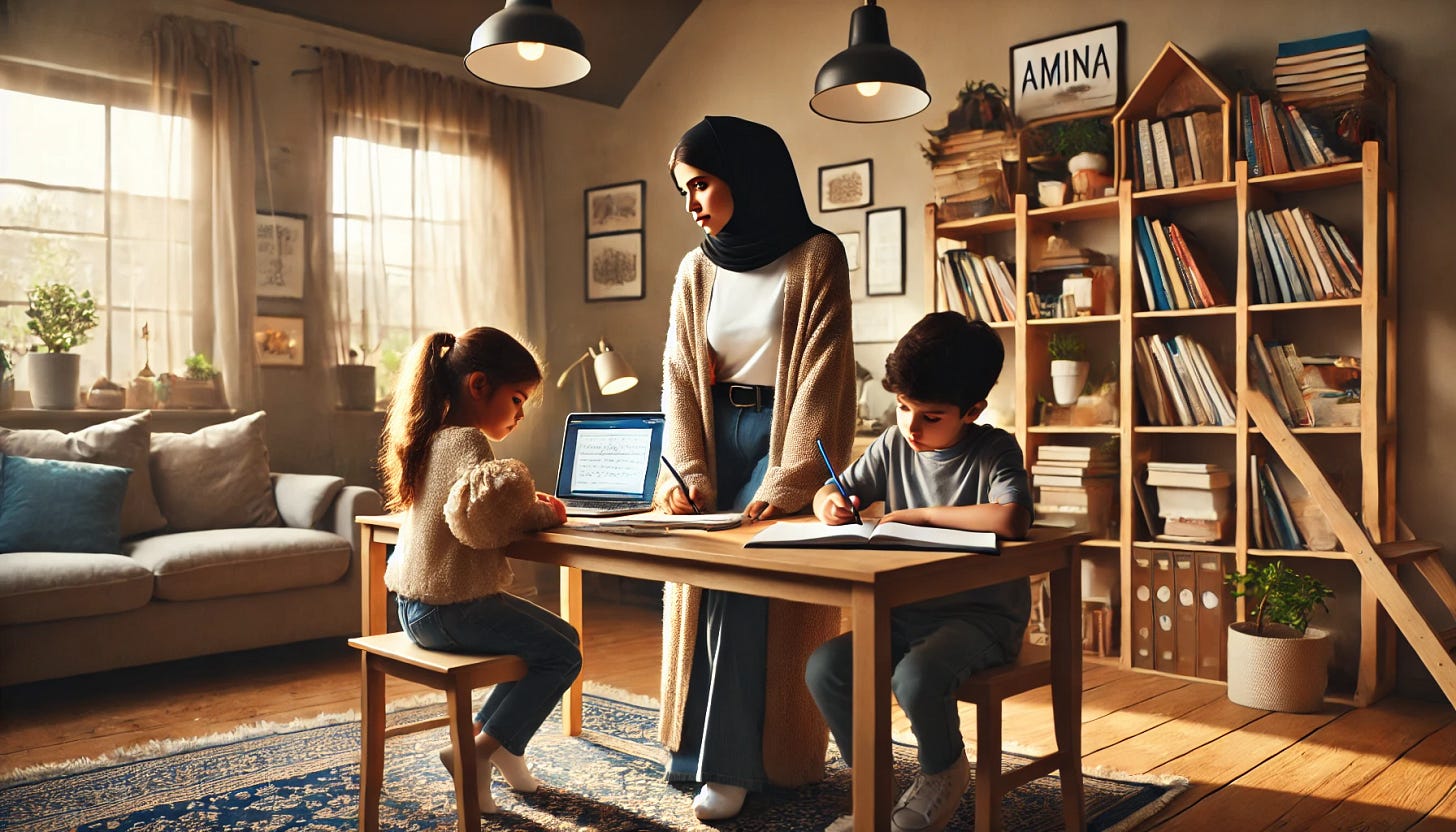Tale#3: Aymen Expresses Her Concerns About Kids Becoming Anti-Social While Homeschooling
Challenges of Social Development for Homeschooled Kids
The crisp evening air carried the scent of freshly cut grass as Aymen strolled into the neighbourhood park, her eyes scanning the playground where Zayn and Sara had already dashed toward the swings. The golden hues of the setting sun draped everything in a soft, warm glow, and the distant laughter of children created a rhythmic background noise.
As she adjusted her scarf and took a seat on a nearby bench, a familiar voice called out, “Aymen! Hey!”
Aymen turned and smiled as Amina walked over, a relaxed warmth in her eyes. Dressed in a casual long cardigan and jeans, Amina had the effortless grace of someone who had just finished a productive day but still had energy left for an engaging conversation. Her three kids trailed slightly behind, giggling as they made their way toward the jungle gym.
“Hey, stranger! Been a while,” Aymen greeted, shifting to make space for Amina on the bench.
“I know. Life’s been a whirlwind,” Amina exhaled, glancing at her kids. “But I’m glad we ran into each other. The kids needed to burn off some energy, and I needed some fresh air. How’ve you been?”
Aymen chuckled, tucking a stray strand of hair under her hijab. “Same old, same old. Just juggling housework, keeping up with the kids, and trying to squeeze in some me-time—when that exists.”
Amina laughed. “Tell me about it. The laundry pile seems to have a life of its own.”
The conversation started as it always did—effortless, bouncing between the mundane details of life. The latest unpredictable weather swings, an upcoming community event, and the eternal struggle of getting kids to eat vegetables. But then, as their words meandered, Aymen hesitated for a second before bringing up something that had been on her mind for a while.
“So, how’s homeschooling going for you?” she asked, tilting her head slightly. “I mean, really—how are you managing everything?”
Amina’s face lit up, and she sat up a little straighter. “Honestly? It’s been amazing. A lot of work, no doubt. But I wouldn’t trade it for anything.”
Aymen nodded slowly, processing her words. “I get the appeal, really. The flexibility, the tailored education… But, I don’t know, I’ve always been a little wary of it.”
Amina gave her a knowing look “You think it makes kids anti-social, don’t you?”
Aymen sighed, embarrassed at how easily Amina had read her mind. “Well… yeah. I mean, don’t get me wrong, I think homeschooling has so many benefits. But I worry about social skills, about kids missing out on the friendships, the group projects, the teamwork stuff that school naturally provides.”
Amina nodded. “I hear you. Believe me, I had the same concerns. I mean, I was a public school kid myself. The idea of homeschooling felt so… countercultural at first. But before I made the jump, I did a deep dive into the research on this. I wasn’t about to make a decision like this without understanding what I was walking into.”
She pulled out her phone and scrolled through her notes. “So, here’s the deal—there’s this huge misconception that homeschooled kids are awkward hermits with zero social skills. But studies don’t actually support that.”
Aymen leaned in, curious. “Really?”
“Yep. According to a 2020 study published in The Journal of School Choice, homeschooled kids actually score higher on socialization metrics compared to traditionally schooled kids.1 They’re more engaged in their communities, have stronger family bonds, and often participate in extracurriculars like sports, volunteering, and faith-based groups. Another research piece from The National Home Education Research Institute found that 87% of homeschooled graduates said they felt well-socialized in adulthood.”2
Aymen raised an eyebrow. “That’s actually surprising.”
Amina nodded. “I know. And it makes sense when you think about it. Traditional school forces kids into socialization, but it’s not necessarily quality socialization. Think about it—just because a kid spends eight hours a day with peers doesn’t mean they’re forming deep, meaningful relationships. In homeschooling, I get to be intentional about their social life. They have playdates, sports teams, Quran circles, community events… You name it.”
Aymen let that sink in. “Okay, but don’t you ever feel like you’re missing out on some of the classic school experiences? Like, school spirit weeks, pep rallies, class trips?”
Amina chuckled. “Sure, but we make our own traditions. We do field trips all the time, but instead of just tagging along on a pre-planned school trip, we actually get to explore in-depth. Last month, we visited a history museum and spent all day there. No rushing back for the school bus. We celebrated ‘Crazy Hat Day’ last week just for fun. My kids have a chess club, a robotics group, and they meet with other homeschool families regularly.”
Aymen smiled, intrigued. “Okay, that actually sounds… kinda awesome.”
Amina smirked. “It is. Look, homeschooling isn’t for everyone, but the idea that it automatically leads to isolation is just outdated. It’s about how you do it. If you just keep your kids locked up at home, sure, they’ll be awkward. But if you’re intentional, they end up having a richer social life because they interact with people of all ages, not just kids their own age.”
Aymen nodded, impressed. “I never thought about it that way.”
Amina nudged her playfully. “See? I told you. Now, don’t get me wrong, there are challenges. Some days, I feel like I’m juggling a million things. But as technology evolves, I feel like homeschooling is going to become even more accessible. The resources we have now? Insane. Online courses, virtual co-ops, tutoring services. Imagine what it’ll be like in ten years.”
One of the best parts of our homeschooling setup is that we have a dedicated Quran learning time built into our schedule," Amina added, her eyes bright with satisfaction. "Online Quran classes have been a game-changer for us. The kids get to learn directly from native Arabic teachers, right from home. No rushing to a weekend madrasa, no compromising on pronunciation—it’s all structured and tailored to their pace. Knowing that they are learning to read the Quran properly, with the right Tajweed, gives me so much peace of mind. It’s honestly one of the most fulfilling aspects of homeschooling for me.
Aymen sighed, looking at Zayn and Sara, who were now deep in conversation with Amina’s kids. “Yeah, you’re right. The world’s changing fast. And honestly? I think homeschooling has a bright future. It’s not what it used to be.”
Amina smiled. “Exactly. It’s all about keeping an open mind. Who knows? Maybe one day, you’ll give it a shot.”
Aymen laughed. “One step at a time. But hey, I respect the effort you put into it. Your kids are thriving, and that’s what matters.”
Amina winked. “That’s all we can hope for, isn’t it?”
Aymen finally got the answer she was looking for. This is exactly what worries most parents when they consider homeschooling their kids. While homeschooling is often seen as the future of education, guaranteeing success isn’t always straightforward. It really depends on how well kids adapt, how parents structure their learning, and most importantly, how they stay socially engaged. Real-life experiences and shared insights from families who’ve tried it help shape the best approach. What do you think? Have you ever considered homeschooling, or do you know someone who has? I’d love to hear your thoughts or any personal stories you’ve come across!
https://nheri.org/a-systematic-review-of-the-empirical-research-on-selected-aspects-of-homeschooling-as-a-school-choice/
https://nheri.org/research-facts-on-homeschooling/







